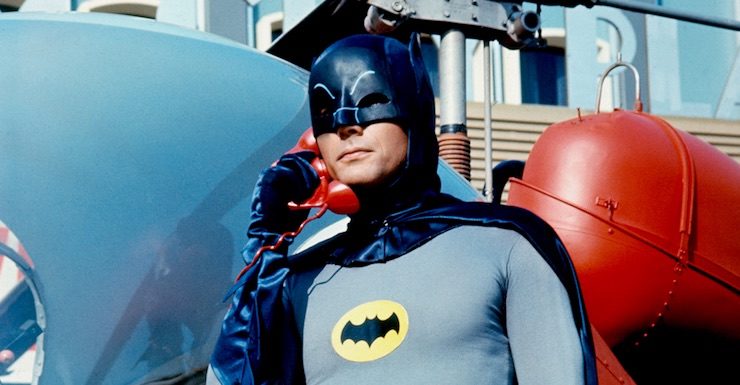A pop-culture giant has shuffled off this four-color coil. Adam West, who played the title role in the 1966 Batman, and later reprised the role in voice and physical form more than once, has died of leukemia at the age of 88.
Having just spent a year and a half revisiting West’s most famous role for this very site, I now present the five best Bat-moments West had in his run on television wearing the cape and cowl:
1. The Bat-usi
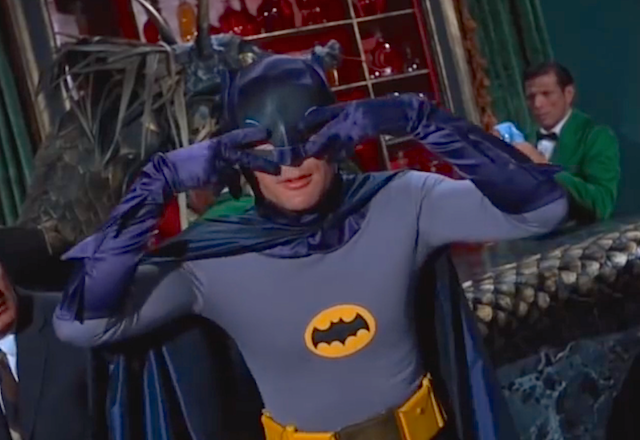
Actually, the entire scene in the bar that leads up to Batman doing that magnificent dance in “Hi Diddle Riddle,” the first episode of Batman to air, is pretty much vintage West Batman. We start with him entering the discotheque and refusing the offer of a table, instead going to the bar because he doesn’t want to draw attention to himself. Reportedly, that scene was the one West read for his audition, and one of the reasons why he got the part was that he played that line 100% straight rather than wink at the camera or be a goof about it. Perhaps the best thing about West’s portrayal was that he took it completely seriously. He refused to stoop to the joke, which is why little kids (like me!) could watch the show unironically and view Batman as a hero who did good. We took him seriously as a hero because he took himself seriously as one.
Even when it was totally ridiculous. Like trying to be inconspicuous while walking into a discotheque while wearing a brightly colored skintight outfit and a big blue cape. And dancing a silly dance, though the latter was after they put a mickey in his fresh-squeezed orange juice.
Oh yeah! He goes into a discotheque alone, because Robin is underage, and then orders fresh-squeezed orange juice. Bliss.
2. Batman and Robin strike a blow for art
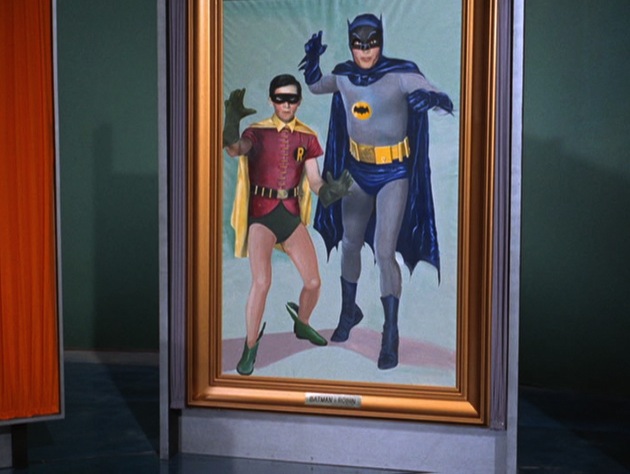
Gotham City was regularly a substitute for New York City, with establishing shots of NYC subbing for Gotham, and place names riffs on locations in the Big Apple: Spiffany’s, Short Island, the United World Building, and so on, not to mention the mayor and governor (Linseed and Stonefellow) being riffs on the contemporary officeholders in New York (Lindsay and Rockefeller). In “When the Rat’s Away the Mice Will Play,” the climactic fisticuffs with the Riddler are held in the torch of the Queen of Freedom monument, which has an art gallery that includes a simply hideous painting of Batman and Robin.
In order to make a dramatic entrance, Batman and Robin burst through the painting in the spots corresponding to where their images are. This has the dual effect of looking cool and utterly destroying that bloody awful painting. So win-win.
3. Batman unmasks a criminal via his parking habits
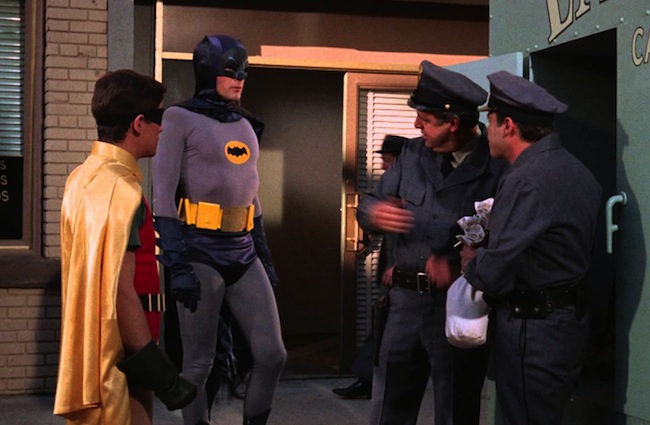
False Face was a frustrating villain for the Dynamic Duo to deal with because he was a master of disguise and so could appear as anyone. At various points, he poses as both Commissioner Gordon and Chief O’Hara, thus providing Neil Hamilton and especially Stafford Repp with a chance to act outside of their characters’ usual range of “fawning over Batman.” At one point, Batman and Robin see an armored car, and Batman quickly deduces that one of the armored car drivers must be False Face because he notices that the armored car parked in front of a fire hydrant!
Only a criminal would callously park in front of a hydrant like that, Batman announces, and False Face is exposed! You gotta love the bat-logic. (For the record, I can’t remember the last time I didn’t see an armored car parked illegally while it was making a pickup……)
4. Bruce Wayne exposes himself to art
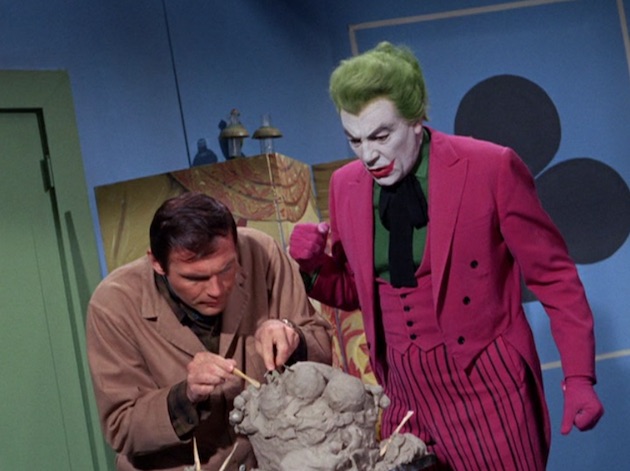
In “Pop Goes the Joker,” the titular villain opens an art school for millionaires as a cover for a kidnapping scheme. At this point, Joker has already become the darling of the art world with his abstract work. As Bruce Wayne, Batman decides to take the class to see what the Joker is up to. Most of the time, West only got to be Bruce long enough for Alfred to tell him the bat-phone was ringing, and he took advantage of this particular opportunity to engage in a delightful battle of wits with the clown prince of crime:
JOKER: That’s terrible—terrible, Wayne! Why even a three-year-old could do better than that. Here, let me show you.
[Joker mushes the sculpture to make it more abstract.]
JOKER: There! That’s more like it!
BRUCE: Yes, I see what you mean, that’s about the level of a three-year-old.
JOKER: I do the jokes around here, Wayne.
BRUCE: I’d say that’s one of your better ones.
5. Milk and cookies
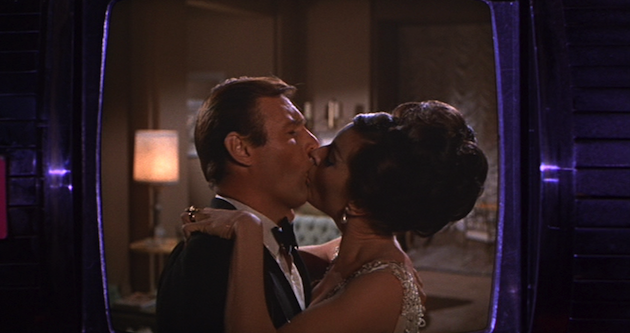
In the comics, Bruce Wayne has always been portrayed as a womanizer and playboy. It’s part of the “disguise” of Bruce to keep people from even considering the notion that he’s really Batman. Because Batman was designed to appeal to all audiences, this particular aspect was downplayed heavily (though hints of it came out in Bruce’s interactions with Barbara Gordon, a.k.a. Batgirl, in the third season). Amusingly, though, it did get used as a plot point twice, and both times it was when West was acting opposite Lee Meriwether. The first was in the 1966 Batman movie, where Julie Newmar’s lack of availability forced them to re-cast Catwoman with Meriwether. In the film, Catwoman pretends to be a Russian journalist who flirts outrageously with Bruce, and Bruce responds. They even smooch!
But that’s nowhere near as much fun as when Meriwether returns in “King Tut’s Coup”/”Batman’s Waterloo” as Lisa Carson, the daughter of a multimillionaire, who is taken hostage by King Tut and whom the villain believes is the reincarnation of Cleopatra. At the end of the episode, Bruce walks her home and she invites him in for “milk and cookies.” Bruce accepts, as man cannot live by crimefighting alone and milk and cookies is the best-ever euphemism for getting laid you guys!
Honorable mention: Beware the Gray Ghost
Andrea Romano has been responsible for the casting of much of Warner Bros.’ animated releases over the decades, and she’s the best in the business. On the 1990s Batman: The Animated Series, she pulled off many a casting coup (particularly Kevin Conroy in the title role, who remains the definitive Batman voice), and for the episode “Beware the Gray Ghost,” she pulled off her best. For the role of Simon Trent, an actor who played the hero the Gray Ghost in an old TV series that Bruce Wayne watched as a boy, and who was now old and broke due to being typecast, she cast Adam West. He nailed the role, a wonderful love letter to West’s Batman that acknowledges his inspirational role as a hero, and also was a good commentary on how typecasting can ruin an actor’s career, but you can make it work if you embrace it instead of rejecting it.
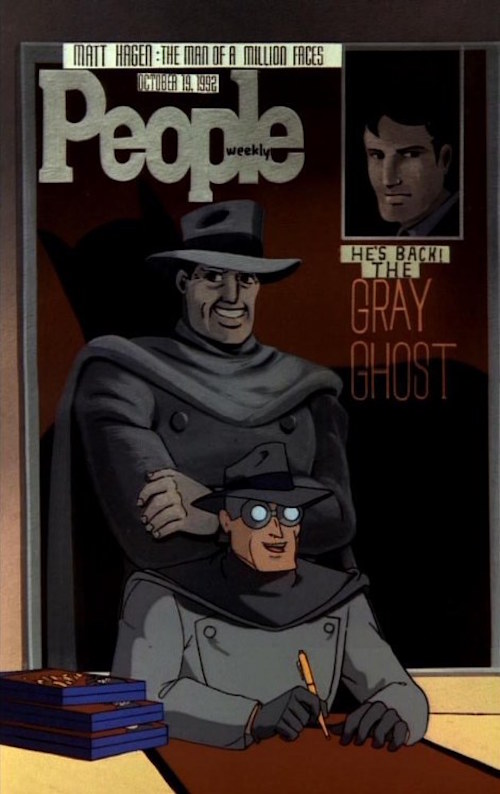
Kinda like what Adam West did.
Rest in peace, old chum.
(Please feel free to provide your favorite West moments in the comments. I could easily come up with another five as it is…….)
Keith R.A. DeCandido reviewed the entirety of Batman 66 in the “Holy Rewatch, Batman!” feature on this site from September 2015 to May 2017. He’s also written about Star Trek, Doctor Who, Stargate, Marvel’s Netflix series, and Wonder Woman here. His 53rd novel, Marvel’s Warriors Three: Godhood’s End (Book 3 of the “Tales of Asgard” trilogy) was released last month, with two more due out this year: Mermaid Precinct, the next book in his fantasy police procedural series, and A Furnace Sealed, the first in his new urban fantasy series.










